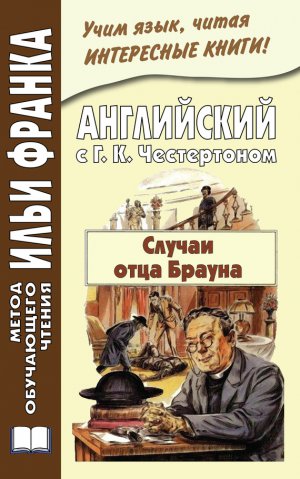Английский с Г. К. Честертоном. Случаи отца Брауна / Gilbert Keith Chesterton. The Sins of Prince Saradine. The Eye of Apollo Честертон Гилберт

“Then how did she die?” asked Flambeau impatiently (тогда как же она умерла? – спросил Фламбо нетерпеливо).
“She was murdered (ее убили).”
“But she was alone,” objected the detective (но она /же/ была одна, – возразил детектив).
“She was murdered when she was all alone,” answered the priest (ее убили, когда она была одна, – отвечал священник).
All the rest stared at him (все остальные уставились на него), but he remained sitting in the same old dejected attitude (но он продолжал сидеть: «оставался сидящим» в той же удрученной позе, как и раньше: «в той старой удрученной позе»), with a wrinkle in his round forehead (с морщинкой на его округлом лбе) and an appearance of impersonal shame and sorrow (и отчужденным выражением стыда и скорби на лице; impersonal – безликий, лишенный индивидуальности; холодный, отчужденный; appearance – появление; внешний вид, наружность); his voice was colourless and sad (голос его стал бесцветным и печальным; to appear – появляться; казаться).
“Why, then,” cried Flambeau, “Pauline was alone when she fell, and it was suicide!”
“She was alone when she fell,” said Father Brown, “but it was not suicide.”
“Then how did she die?” asked Flambeau impatiently.
“She was murdered.”
“But she was alone,” objected the detective.
“She was murdered when she was all alone,” answered the priest.
All the rest stared at him, but he remained sitting in the same old dejected attitude, with a wrinkle in his round forehead and an appearance of impersonal shame and sorrow; his voice was colourless and sad.
“What I want to know,” cried Kalon, with an oath (что я хочу знать, – воскликнул Калон, выругавшись; oath – клятва, присяга; проклятие, ругательство), “is when the police are coming for this bloody and wicked sister (так это когда полиция придет за этой проклятой и злобной сестрицей; bloody – кровавый, окровавленный; проклятый /брит., груб./). She’s killed her flesh and blood (она убила свою родную сестру: «свою плоть и кровь»); she’s robbed me of half a million (она ограбила меня на полмиллиона) that was just as sacredly mine as (которые были уже законно моими, как…; sacredly – свято; нерушимо; sacred – священный) – ”
“Come, come, prophet,” interrupted Flambeau, with a kind of sneer (ну, будет вам, пророк, хватит, – оборвал его Фламбо с каким-то подобием презрительной усмешки; come! – стой! погоди! /разг./; a kind of – нечто вроде); “remember that all this world is a cloudland (вспомните, что весь этот мир эфемерен).”
“What I want to know,” cried Kalon, with an oath, “is when the police are coming for this bloody and wicked sister. She’s killed her flesh and blood; she’s robbed me of half a million that was just as sacredly mine as – ”
“Come, come, prophet,” interrupted Flambeau, with a kind of sneer; “remember that all this world is a cloudland.”
The hierophant of the sun-god made an effort to climb back on his pedestal (верховный жрец солнечного бога сделал попытку взобраться назад на свой пьедестал; effort – усилие, напряжение; попытка). “It is not the mere money,” he cried (это не просто деньги, – вскричал он), “though that would equip the cause throughout the world (хотя они помогли бы распространить мою религию по всему миру; to equip – снаряжать, оснащать; снабжать; cause – причина, основание; дело, цель). It is also my beloved one’s wishes (это также было желанием моей возлюбленной). To Pauline all this was holy (для Полин все это было свято). In Pauline’s eyes (в глазах Полин) – ”
Father Brown suddenly sprang erect (внезапно отец Браун вскочил, /плечи его/ распрямились; to spring – прыгать, скакать; вскакивать; erect – прямой), so that his chair fell over flat behind him (так что его кресло опрокинулось позади него; to fall over – опрокидываться; flat – плоский; распростертый, растянувшийся во всю длину /обычно о человеке/). He was deathly pale (он был смертельно бледен), yet he seemed fired with a hope (однако, казалось, он весь воспылал от надежды; to fire – зажигать, поджигать; воодушевляться, загораться /чем-л./); his eyes shone (глаза его сверкали; to shine – светить, сиять; блестеть, сверкать).
The hierophant of the sun-god made an effort to climb back on his pedestal. “It is not the mere money,” he cried, “though that would equip the cause throughout the world. It is also my beloved one’s wishes. To Pauline all this was holy. In Pauline’s eyes – ”
Father Brown suddenly sprang erect, so that his chair fell over flat behind him. He was deathly pale, yet he seemed fired with a hope; his eyes shone.
“That’s it!” he cried in a clear voice (вот именно! – воскликнул он звонким голосом; clear – светлый, ясный; звонкий). “That’s the way to begin (вот с чего надо начинать: «это путь, чтобы начать»). In Pauline’s eyes (в глазах Полин) – ”
The tall prophet retreated before the tiny priest in an almost mad disorder (высокий пророк отступил назад перед маленьким священником почти в паническом замешательстве; tiny – крошечный, совсем маленький; mad – сумасшедший, ненормальный; обезумевший, потерявший голову; disorder – беспорядок; смятение). “What do you mean (что вы имеете в виду)? How dare you?” he cried repeatedly (да как вы смеете? – выкрикивал он одно и то же; repeatedly – часто, неоднократно; to repeat – повторять).
“In Pauline’s eyes,” repeated the priest (в глазах Полин, – повторил священник), his own shining more and more (тогда как его собственные глаза горели: «сверкали» все сильнее). “Go on – in God’s name, go on (продолжайте, во имя Господа, продолжайте).
“That’s it!” he cried in a clear voice. “That’s the way to begin. In Pauline’s eyes – ”
The tall prophet retreated before the tiny priest in an almost mad disorder. “What do you mean? How dare you?” he cried repeatedly.
“In Pauline’s eyes,” repeated the priest, his own shining more and more. “Go on – in God’s name, go on.
The foulest crime the fiends ever prompted (самый закоснелый преступник, которого когда-либо водили бесы; foul – грязный; гадкий, скверный; fiend – дьявол, враг рода человеческого; злой дух, демон; to prompt – побуждать, толкать /к чему-л./) feels lighter after confession (чувствует себя легче = чувствует облегчение после покаяния; to confess – признавать; сознаваться; исповедоваться); and I implore you to confess (и я очень прошу вас покаяться; to implore – умолять, заклинать). Go on, go on – in Pauline’s eyes (продолжайте, продолжайте, – в глазах Полин) – ”
“Let me go, you devil!” thundered Kalon (пустите меня: «дайте мне уйти», вы, дьявол! – грохотал Калон; to thunder – греметь, грохотать; thunder – гром; грохот, гул), struggling like a giant in bonds (сотрясаясь всем телом, словно скованный гигант; to struggle – бороться; биться, отбиваться; in bonds – в оковах, в путах). “Who are you, you cursed spy, to weave your spiders’ webs round me (кто вы такой, проклятый шпион, чтобы плести свою паучью сеть вокруг меня), and peep and peer (подглядывать и вынюхивать: «и подсматривать»; to peep – заглядывать, подглядывать; to peer – вглядываться; заглянуть, посмотреть)? Let me go (пропустите меня).”
The foulest crime the fiends ever prompted feels lighter after confession; and I implore you to confess. Go on, go on – in Pauline’s eyes – ”
“Let me go, you devil!” thundered Kalon, struggling like a giant in bonds. “Who are you, you cursed spy, to weave your spiders’ webs round me, and peep and peer? Let me go.”
“Shall I stop him (нужно ли мне остановить его)?” asked Flambeau, bounding towards the exit (спросил Фламбо, бросаясь: «прыгая» к выходу), for Kalon had already thrown the door wide open (поскольку Калон уже распахнул двери настежь; to throw – бросать, швырять; быстро приводить в определенное состояние; wide open – распахнутый настежь).
“No; let him pass (нет, пусть идет: «нет, дайте ему пройти»),” said Father Brown, with a strange deep sigh (сказал отец Браун со странным глубоким вздохом) that seemed to come from the depths of the universe (который, казалось, исходит из глубин вселенной). “Let Cain pass by, for he belongs to God (пусть Каин уйдет, поскольку он принадлежит Богу; to pass by – проходить мимо).”
There was a long-drawn silence in the room when he had left it (в комнате, когда он = Калон ее покинул, повисло долгое, затянувшееся молчание; to draw – тянуть, тащить; удлинять, продлевать; silence – тишина. безмолвие; молчание; to leave), which was to Flambeau’s fierce wits one long agony of interrogation (и пытливый разум Фламбо изнывал от накопившихся вопросов; fierce – лютый, свирепый; живой, энергичный; agony – страдание, мука; interrogation – допрос, дознание; вопрос; to interrogate – допрашивать).
“Shall I stop him?” asked Flambeau, bounding towards the exit, for Kalon had already thrown the door wide open.
“No; let him pass,” said Father Brown, with a strange deep sigh that seemed to come from the depths of the universe. “Let Cain pass by, for he belongs to God.”
There was a long-drawn silence in the room when he had left it, which was to Flambeau’s fierce wits one long agony of interrogation.
Miss Joan Stacey very coolly tidied up the papers on her desk (мисс Джоан Стэйси совершенно невозмутимо приводила в порядок бумаги на своем столе; coolly – свежо, прохладно; спокойно, хладнокровно).
“Father,” said Flambeau at last (/святой/ отец, – сказал наконец Фламбо), “it is my duty, not my curiosity only (это мой долг, не одно только любопытство) – it is my duty to find out, if I can (мой долг выяснить, если я способен = если получится; to find out – узнать, выяснить; раскрыть /обман, тайну/), who committed the crime (кто же совершил преступление).”
“Which crime?” asked Father Brown (которое преступление? – спросил отец Браун).
“The one we are dealing with, of course (то, которое мы расследуем; to deal with – заниматься, иметь дело с /кем-л., чем-л./),” replied his impatient friend (нетерпеливо отвечал его друг).
Miss Joan Stacey very coolly tidied up the papers on her desk.
“Father,” said Flambeau at last, “it is my duty, not my curiosity only – it is my duty to find out, if I can, who committed the crime.”
“Which crime?” asked Father Brown.
“The one we are dealing with, of course,” replied his impatient friend.
“We are dealing with two crimes,” said Brown (мы расследуем два преступления), “crimes of very different weight – and by very different criminals (преступления абсолютно: «очень» разные по тяжести, /совершенные/ абсолютно разными людьми: «преступниками»; weight – вес; тяжесть; значимость).”
Miss Joan Stacey, having collected and put away her papers (мисс Джоан Стэйси, собрав и отложив в сторону свои бумаги), proceeded to lock up her drawer (стала запирать ящик стола; to proceed – направляться /куда-л./, проследовать; приступать, приниматься за /что-л./). Father Brown went on (отец Браун продолжал; to go on – продолжать), noticing her as little as she noticed him (обращая на нее не больше внимания, чем она обращала на него: «замечая ее так же мало, как она замечала его»).
“The two crimes,” he observed (эти два преступления, – заметил он; to observe – наблюдать, замечать; сделать замечание, высказаться), “were committed against the same weakness of the same person (были совершены /людьми, которые воспользовались/ одним и тем же физическим недостатком одного и того же человека; weakness – слабость; слабое место, недостаток), in a struggle for her money (в борьбе за ее деньги).
“We are dealing with two crimes,” said Brown, “crimes of very different weight – and by very different criminals.”
Miss Joan Stacey, having collected and put away her papers, proceeded to lock up her drawer. Father Brown went on, noticing her as little as she noticed him.
“The two crimes,” he observed, “were committed against the same weakness of the same person, in a struggle for her money.
The author of the larger crime found himself thwarted by the smaller crime (автор более серьезного преступления обнаружил, что его планы были нарушены менее серьезным преступлением; to thwart – мешать, препятствовать; расстраивать /планы и т. п./; small – маленький; незначительный); the author of the smaller crime got the money (автор менее серьезного преступления получил деньги).”
“Oh, don’t go on like a lecturer,” groaned Flambeau (о, не ведите себя, как на лекции: «не продолжайте, как лектор», – застонал Фламбо); “put it in a few words (скажите /все/ в нескольких словах; to put – класть, положить; выражать, формулировать /мысли, замечания и т. п./).”
“I can put it in one word,” answered his friend (я могу сказать одним словом, – отвечал его друг).
The author of the larger crime found himself thwarted by the smaller crime; the author of the smaller crime got the money.”
“Oh, don’t go on like a lecturer,” groaned Flambeau; “put it in a few words.”
“I can put it in one word,” answered his friend.
Miss Joan Stacey skewered her business-like black hat on to her head (мисс Джоан Стэйси надела на голову свою деловую черную шляпку; to skewer – насаживать на вертел) with a business-like black frown before a little mirror (перед маленьким зеркалом, по-деловому сдвинув черные брови; frown – сдвинутые, насупленные брови), and, as the conversation proceeded (и пока продолжался разговор; to proceed – направляться /куда-л./, проследовать; продолжать /говорить/), took her handbag and umbrella in an unhurried style (неторопливо: «в неспешной манере» взяла сумочку и зонтик), and left the room (и вышла из комнаты; to leave – оставлять, покидать; уходить, уезжать).
“The truth is one word, and a short one,” said Father Brown (истина заключается в одном слове, причем в /довольно/ коротком, – сказал отец Браун). “Pauline Stacey was blind (Полин Стэйси была слепой).”
“Blind!” repeated Flambeau (слепой! – повторил Фламбо), and rose slowly to his whole huge stature (и медленно поднялся во весь свой громадный рост; to rise).
Miss Joan Stacey skewered her business-like black hat on to her head with a business-like black frown before a little mirror, and, as the conversation proceeded, took her handbag and umbrella in an unhurried style, and left the room.
“The truth is one word, and a short one,” said Father Brown. “Pauline Stacey was blind.”
“Blind!” repeated Flambeau, and rose slowly to his whole huge stature.
“She was subject to it by blood,” Brown proceeded (предрасположение к этому досталось ей по наследству: «по крови»; subject – зависимый, подвластный; склонный, предрасположенный /к чему-л./). “Her sister would have started eyeglasses (ее сестра начала бы /носить/ очки) if Pauline would have let her (если бы Полин позволила ей); but it was her special philosophy or fad (но у нее была своя философия или причуда; special – особый, особенный) that one must not encourage such diseases by yielding to them (/насчет того/, что нельзя потворствовать болезням, поддаваясь им; to encourage – ободрять, вселять мужество; потакать; to yield – приносить, давать плоды; сдаваться, поддаваться). She would not admit the cloud (она не хотела признавать, что мрак /становится все гуще/; cloud – облако, туча; завеса); or she tried to dispel it by will (или пыталась рассеять его /силой/ воли). So her eyes got worse and worse with straining (и вот от напряжения ее зрение становилось все хуже и хуже); but the worst strain was to come (но самая худшая = тяжелая нагрузка ей еще предстояла).
“She was subject to it by blood,” Brown proceeded. “Her sister would have started eyeglasses if Pauline would have let her; but it was her special philosophy or fad that one must not encourage such diseases by yielding to them. She would not admit the cloud; or she tried to dispel it by will. So her eyes got worse and worse with straining; but the worst strain was to come.
It came with this precious prophet (она появилась /вместе/ с этим драгоценным пророком), or whatever he calls himself (или как он там себя называет), who taught her to stare at the hot sun with the naked eye (который учил ее смотреть на солнце в зените незащищенным глазом; hot – горячий, жаркий; яркий, интенсивный; naked – голый, без одежды; беззащитный). It was called accepting Apollo (это называлось «принятием Аполлона»). Oh, if these new pagans would only be old pagans (ах, если бы только эти новые язычники были древними язычниками), they would be a little wiser (они были бы немного мудрее)! The old pagans knew (язычники в древности знали) that mere naked Nature-worship must have a cruel side (что простое поклонение природе должно иметь и свою опасную сторону; naked /зд./ – простой, элементарный; cruel – жестокий; мучительный, болезненный). They knew that the eye of Apollo can blast and blind (они знали, что глаз Аполлона может и поразить и ослепить; to blast – сметать сильным порывом ветра; взрывать; наносить вред, поражать).”
It came with this precious prophet, or whatever he calls himself, who taught her to stare at the hot sun with the naked eye. It was called accepting Apollo. Oh, if these new pagans would only be old pagans, they would be a little wiser! The old pagans knew that mere naked Nature-worship must have a cruel side. They knew that the eye of Apollo can blast and blind.”
There was a pause (наступила пауза), and the priest went on in a gentle and even broken voice (и священник продолжал тихим, даже прерывистым голосом; broken – разбитый, сломанный; прерывистый /о голосе/). “Whether or no that devil deliberately made her blind (намеренно или нет, этот негодяй сделал ее слепой – /неизвестно/; devil – дьявол, черт; злой человек; to make), there is no doubt that he deliberately killed her through her blindness (/однако/ нет никаких сомнений в том, что он намеренно убил ее посредством этой слепоты). The very simplicity of the crime is sickening (сама простота замысла: «преступления» приводит в трепет; to sicken – вызывать заболевание; шокировать). You know he and she went up and down in those lifts without official help (вы знаете, и он, и она /умели/ подниматься и спускаться на этих лифтах без помощи специалистов; official – служебный; связанный с исполнением служебных обязанностей); you know also how smoothly and silently the lifts slide (вы знаете также, как плавно и тихо движутся такие лифты; smoothly – гладко, ровно; плавно; to slide – скользить, двигаться плавно).
There was a pause, and the priest went on in a gentle and even broken voice. “Whether or no that devil deliberately made her blind, there is no doubt that he deliberately killed her through her blindness. The very simplicity of the crime is sickening. You know he and she went up and down in those lifts without official help; you know also how smoothly and silently the lifts slide.
Kalon brought the lift to the girl’s landing (Калон поднялся на лифте до этажа девушки; to bring – приносить, приводить, доставлять), and saw her, through the open door, writing in her slow, sightless way (и через открытую дверь увидел, как она пишет в своей медленной незрячей манере) the will she had promised him (завещание, о котором говорила ему: «которое обещала ему»). He called out to her cheerily (он весело крикнул ей) that he had the lift ready for her (что лифт для нее готов), and she was to come out when she was ready (и она должна выйти = и пусть она выходит, когда будет готова). Then he pressed a button (затем он нажал кнопку) and shot soundlessly up to his own floor (и бесшумно взмыл на свой «собственный» этаж; to shoot – стрелять; пронестись, промчаться; sound – звук; шум), walked through his own office, out on to his own balcony (прошел через свою контору на балкон), and was safely praying before the crowded street (и /стал/ преспокойно молиться перед толпой на улице; safe – безопасный, не связанный с риском) when the poor girl, having finished her work (тогда как бедная девушка, закончив свое дело), ran gaily out to where lover and lift were to receive her, and stepped (весело подбежала к тому месту, где ее должен был ждать возлюбленный с лифтом, и шагнула; to run) – ”
Kalon brought the lift to the girl’s landing, and saw her, through the open door, writing in her slow, sightless way the will she had promised him. He called out to her cheerily that he had the lift ready for her, and she was to come out when she was ready. Then he pressed a button and shot soundlessly up to his own floor, walked through his own office, out on to his own balcony, and was safely praying before the crowded street when the poor girl, having finished her work, ran gaily out to where lover and lift were to receive her, and stepped – ”
“Don’t!” cried Flambeau (не /продолжайте/! – воскликнул Фламбо).
“He ought to have got half a million by pressing that button (он должен был получить полмиллиона, нажав на ту кнопку),” continued the little father, in the colourless voice (продолжал маленький священник бесцветным голосом) in which he talked of such horrors (которым он всегда говорил о подобных ужасных /вещах/). “But that went smash (но все пошло не так; to go smash – потерпеть провал; smash – шум, грохот /при падении/; to smash – разбивать; крушить; ломать). It went smash because there happened to be another person (он потерпел неудачу, потому что вмешался еще один человек; to happen – случаться, происходить; оказываться /случайно/) who also wanted the money (который тоже хотел этих денег), and who also knew the secret about poor Pauline’s sight (и который также знал тайну, /связанную/ со зрением Полин). There was one thing about that will (в завещании было кое-что; thing – вещь; нечто, кое-что) that I think nobody noticed (чего, я полагаю, никто не заметил): although it was unfinished and without signature (хотя оно было не закончено и не имело подписи: «и без подписи»), the other Miss Stacey and some servant of hers had already signed it as witnesses (другая мисс Стэйси и кто-то из ее слуг: «и какой-то ее слуга» уже подписали его как свидетели).
“Don’t!” cried Flambeau.
“He ought to have got half a million by pressing that button,” continued the little father, in the colourless voice in which he talked of such horrors. “But that went smash. It went smash because there happened to be another person who also wanted the money, and who also knew the secret about poor Pauline’s sight. There was one thing about that will that I think nobody noticed: although it was unfinished and without signature, the other Miss Stacey and some servant of hers had already signed it as witnesses.
Joan had signed first (Джоан подписала первой), saying Pauline could finish it later (сказав, что Полин может закончить = дописать его позже), with a typical feminine contempt for legal forms (со свойственным женщинам пренебрежением: «презрением» к юридическим формальностям; typical – типичный; характерный; feminine – женский, присущий женщинам). Therefore, Joan wanted her sister to sign the will without real witnesses (следовательно, Джоан хотела, чтобы ее сестра подписала завещание без настоящих = сторонних свидетелей). Why (почему)? I thought of the blindness, and felt sure (я вспомнил о слепоте /Полин/ и почувствовал уверенность) she had wanted Pauline to sign in solitude (в том, что она = Джоан хотела, чтобы Полин подписала его, /находясь/ в одиночестве) because she had wanted her not to sign at all (потому что хотела, чтобы та не подписывала его вообще).
Joan had signed first, saying Pauline could finish it later, with a typical feminine contempt for legal forms. Therefore, Joan wanted her sister to sign the will without real witnesses. Why? I thought of the blindness, and felt sure she had wanted Pauline to sign in solitude because she had wanted her not to sign at all.
“People like the Staceys always use fountain pens (такие люди, как /сестры/ Стэйси, всегда пользуются наливным пером); but this was specially natural to Pauline (и особенно это было характерно: «естественно» для Полин). By habit and her strong will and memory (благодаря привычке, сильной воле и памяти) she could still write almost as well as if she saw (она могла писать почти так же хорошо, как если бы она /могла/ видеть); but she could not tell when her pen needed dipping (но она не могла знать: «сказать», когда ее перо нуждается в заправке; to dip – погружать, окунать; зачерпывать). Therefore, her fountain pens were carefully filled by her sister (поэтому сестра заботилась о том, чтобы ее наливные ручки были наполнены; carefully – заботливо) – all except this fountain pen (все, кроме этой «наливной ручки»). This was carefully not filled by her sister (сестра позаботилась, чтобы эта не была наполнена); the remains of the ink held out for a few lines (остатка чернил хватило на несколько строк; to hold out – хватать) and then failed altogether (а затем они полностью иссякли; to fail – терпеть неудачу; кончаться, иссякать).
“People like the Staceys always use fountain pens; but this was specially natural to Pauline. By habit and her strong will and memory she could still write almost as well as if she saw; but she could not tell when her pen needed dipping. Therefore, her fountain pens were carefully filled by her sister – all except this fountain pen. This was carefully not filled by her sister; the remains of the ink held out for a few lines and then failed altogether.
And the prophet lost five hundred thousand pounds (а пророк потерял пятьсот тысяч фунтов; to lose) and committed one of the most brutal and brilliant murders in human history for nothing (и напрасно совершил одно из самых жестоких и выдающихся убийств в истории человечества; for nothing – даром, зря).”
Flambeau went to the open door (Фламбо подошел к открытой двери) and heard the official police ascending the stairs (и услышал как по лестнице поднимаются «официальные» полицейские). He turned and said (он обернулся и сказал): “You must have followed everything devilish close (должно быть, вы чертовски пристально ко всему приглядывались; to follow – следовать, идти за; следить; close – близко, рядом; внимательно, тщательно) to have traced the crime to Kalon in ten minutes (ибо за десять минут установили, что следы преступления ведут к Калону; to trace – проследить).”
Father Brown gave a sort of start (отец Браун вздрогнул; to give – давать; делать какое-л. движение или жест).
And the prophet lost five hundred thousand pounds and committed one of the most brutal and brilliant murders in human history for nothing.”
Flambeau went to the open door and heard the official police ascending the stairs. He turned and said: “You must have followed everything devilish close to have traced the crime to Kalon in ten minutes.”
Father Brown gave a sort of start.
“Oh! to him,” he said (о! к нему, – сказал он). “No; I had to follow rather close (нет, мне пришлось весьма пристально приглядываться) to find out about Miss Joan and the fountain pen (чтобы разобраться с мисс Джоан и наливным пером). But I knew Kalon was the criminal before I came into the front door (но я знал, что Калон – преступник, прежде чем вошел в парадную дверь /здания/).”
“You must be joking!” cried Flambeau (вы, должно быть, шутите! – воскликнул Фламбо; to joke).
“I’m quite serious,” answered the priest (я вполне серьезно, – отвечал священник). “I tell you I knew he had done it (говорю же вам, я знал, что он сделал это), even before I knew what he had done (даже до того, как я узнал, что он сделал).”
“But why (но почему)?”
“These pagan stoics,” said Brown reflectively (эти языческие стоики, сказал отец Браун задумчиво; to reflect – отражать /свет, звук/; раздумывать, размышлять), “always fail by their strength (всегда страдают: «терпят неудачу» из-за своей силы). There came a crash and a scream down the street (внизу, на улице раздались грохот и крики), and the priest of Apollo did not start or look round (а жрец Аполлона /даже/ не вздрогнул и не осмотрелся). I did not know what it was (я не знал, что это было = что произошло). But I knew that he was expecting it (но я знал, что он этого ждет).”
“Oh! to him,” he said. “No; I had to follow rather close to find out about Miss Joan and the fountain pen. But I knew Kalon was the criminal before I came into the front door.”
“You must be joking!” cried Flambeau.
“I’m quite serious,” answered the priest. “I tell you I knew he had done it, even before I knew what he had done.”
“But why?”
“These pagan stoics,” said Brown reflectively, “always fail by their strength. There came a crash and a scream down the street, and the priest of Apollo did not start or look round. I did not know what it was. But I knew that he was expecting it.”






